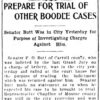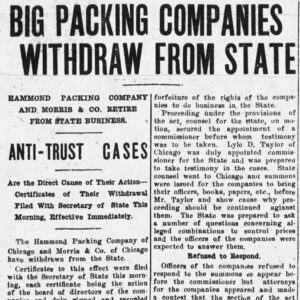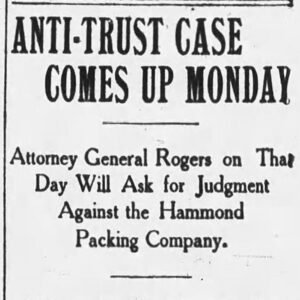calsfoundation@cals.org
Hammond Packing Company v. Arkansas
The U.S. Supreme Court heard only one case from Arkansas among several important antitrust lawsuits during the Progressive Era, a time when many states were waging crusades against big-business monopolies: Hammond Packing Company v. Arkansas, 212 U.S. 322 (1909). The state won, and the Court’s decision provided a remedy for corporate obstruction in the discovery phase of litigation and established an important precedent that became a cornerstone of Rule 37 in Federal Rules of Civil Procedure.
Using a 1905 Arkansas antitrust law, Robert L. Rogers, who was the state’s attorney general, and Lewis Rhoton, prosecuting attorney in Pulaski County, waged numerous antitrust lawsuits. Several were aimed at the so-called “Beef Trust,” seeking penalties ranging from $30,000 to $7 million, as well as forfeiture of the meatpackers’ right to conduct business in the state. Rogers and Rhoton must have felt that the Beef Trust’s various packing companies were easy targets and that a legal victory would help curtail corporate wrongdoing. Rogers sought the Democratic gubernatorial nomination in the March 1906 primary but was defeated, despite his antitrust crusade.
Across the nation, the major American meatpacking firms were already in litigation. The U.S. Department of Justice won an injunction in January 1905 in the U.S. Supreme Court case of Swift & Company v. United States for alleged violations of the Sherman Antitrust Act. Six months later, the department also obtained indictments of packer officials and their corporations. During the same period, muckrakers Charles Edward Russell and Upton Sinclair published a series of magazine articles revealing the exploitative business practices and unsanitary conditions involved in the production of the nation’s meats. Sinclair’s 1906 novel based upon these articles, The Jungle, had an explosive effect. In response, President Theodore Roosevelt urged, and Congress passed, the Meat Inspection Act and the Pure Food and Drug Act that same year. Despite these circumstances, Rogers and Rhoton’s lawsuits met determined opposition from the packers, and even the federal government had to mount numerous investigations and suits against the Beef Trust over two decades from 1902 to 1922 before bringing its own antitrust litigation to a satisfactory end.
In September 1906, Rogers secured a Pulaski County Circuit Court order for the appointment of a commissioner, Lyle D. Taylor of Chicago, Illinois, to hold hearings in that city. There, in the discovery phase of litigation, the attorney general could take depositions and review records from packing company officials.
The Arkansas attorney general and two assistants waited ten days in late September 1906 as packing company officials repeatedly delayed appearing at a hearing. Finally, on October 2, the company’s attorney, William E. Hemingway of Little Rock (Pulaski County), told Rogers that J. Ogden Armour, a member of the Hammond Packing Company board of directors and the meatpacking industry’s most important leader, had refused to be deposed or to produce company documents. Rogers did not obtain subpoenas to compel testimony, as others had done, perhaps because he had inadequate funds for prolonged litigation. The Arkansas General Assembly had authorized only $5,000 to pursue antitrust cases (by comparison, Missouri budgeted $60,000).
The opposing attorneys resolved the impasse by agreeing to use the suit against the Hammond firm as a test case to determine the constitutionality of Arkansas’s antitrust law, particularly Sections 8 and 9. These clauses provided that if officials of a company refused to appear before a commissioner or to provide records, a judge could render a default judgment for the state. Hammond’s attorneys no doubt believed precedent was on their side. The Supreme Court had ruled in Hovey v. Elliott, 167 U.S. 409 (1897) that a default judgment issued by a judge for contempt in that case was an unconstitutional violation of the Fourteenth Amendment’s due process clause. It was agreed that if packers lost the case, the Hammond firm would pay Arkansas a penalty of $10,000 and court costs, a nominal amount considering the huge profits made by the meatpackers.
The case, first, had to return for a decision at the Pulaski County Circuit Court, where Judge Edward W. Winfield gave a default judgment for the state. Briefs and oral arguments were next presented to the Arkansas Supreme Court on December 31, 1906, the last day on which Rogers served as attorney general. Early in the term of Rogers’s successor, William F. Kirby, Arkansas’s upper court also ruled against Hammond. The new attorney general apparently had little interest in antitrust cases and filed no new cases. He left Prosecutor Rhoton in charge of cases already in process. Thus, when the Hammond case was appealed to the Supreme Court, Rhoton was the lead attorney.
Because the U.S. Supreme Court determined which appeals it would accept and could decide not to take up the Hammond case, Rhoton moved forward as though the Arkansas Supreme Court’s decision was final. He filed new cases against all packing companies on January 18, 1907. In response, the packers took steps in February to protect their assets by withdrawing altogether from Arkansas. The companies requested that the Arkansas Secretary of State’s Office nullify their charters to do business in the state, and they sold their in-state facilities. But they also sought to continue to profit from sales in the state. The Armour Packing Company, for example, sold its Little Rock premises to Southern Best and Provision Company of Alabama. The new company was to sell only Armour products.
On February 19, 1908, the Court received briefs and heard oral arguments in the Hammond case. Lewis Rhoton made his state’s presentation and answered the justices’ questions. Little Rock attorneys James Stevenson and Guy Fulk aided the prosecutor. Fulk, a graduate of George Washington University Law School, largely wrote the brief submitted to the court. Hemingway and a Philadelphia, Pennsylvania, lawyer appeared for the packing company.
On February 23, 1909, Justice Edward Douglass White, writing for the court’s majority of seven justices (with two justices in dissent) upheld Arkansas’s side. He rejected defense arguments that Section 8 of the Arkansas antitrust statute, which provided for a court appointment of a commissioner to take testimony of officials and production of records, violated constitutional guarantees against search and seizure and self-incrimination; and that Section 9, providing for default judgment, violated Fifth and Fourteenth Amendment protections of equal protection and due process. Justice White also dismissed defense arguments that Arkansas had illegally exercised extraterritorial jurisdiction beyond its borders because the law referenced acts “in state or elsewhere.”
White accepted the Arkansas Supreme Court’s interpretation on this point. The state’s plenary power prevailed to set conditions under which corporate charters were granted to domestic as well as to foreign companies (those incorporated in other states) to conduct business. A state could enumerate activities required of a company seeking a charter that might prohibit actions within another jurisdiction. Moreover, a state could compel testimony of officials and examination of books, including those outside its borders, to ascertain whether its laws had been complied with; such a discovery process might help to defend as well as to prosecute a company. The Arkansas statute provided for several steps, including a hearing. These procedures afforded due process, unlike the circumstances of the Hovey case, in which a judge issued a default judgment for contempt. Arkansas’s victory in the Hammond case was hailed as a significant addition to the inquisitorial powers of states dealing with alleged trusts.
Three days after the Hammond decision was handed down, Pulaski County’s new prosecuting attorney, Roy D. Campbell, acting on behalf of the state, and its new attorney general, Hal L. Norwood, filed new suits against the meatpacking companies for the maximum possible penalties of the 1905 antitrust law, amounting in total to $19,800,000. Meatpackers’ attorneys announced that vigorous defenses would be mounted.
In June 1909, Norwood agreed to settle all claims for $25,000, including the $10,000 awarded in the Hammond case. He defended this decision by pointing out how difficult and costly it would be to carry suits once more through the courts and, if suits were won, to reach the assets of the packers, for few remained in the state. Moreover, the state’s school fund benefited, as the antitrust law required the larger part of such settlements go to education. However small this amount might seem, it was similar to what other states had accepted.
While the Hammond case was important for its precedent, its outcome—like those of most other state antitrust suits—revealed the weakness of individual states against large corporations. In most cases, only the resources and legal authority of the national government could mount successful antitrust suits that truly broke up corporate monopolies.
When varied procedures in civil litigation were finally made more uniform with the issuance in 1937 of Federal Rules of Civil Procedure, its Rule 37 provided sanctions that included one like that of the Hammond case for “failure to make disclosures or to cooperate in discovery.”
For additional information:
Cutner, Helen H. “Discovery—Civil Litigation’s Fading Light: A Lawyer Looks at the Federal Discovery Rules after Forty Years of Use.” Temple Law Quarterly 52, no. 4 (1979): 933–989.
Gordon, David, “The Beef Trust: Antitrust Policy and the Meat Packing Industry, 1902–1922.” PhD diss., Claremount Graduate School, 1983.
Hammond Packing Co. v. State. 81 Ark. 519 (1907).
Hammond Packing Company v. Arkansas. 212 U.S. 322 (1909).
May, James. “Antitrust Practice and Procedure in the Formative Era: The Constitutional and Conceptual Reach of State Antitrust Law, 1880–1918.” University of Pennsylvania Law Review 135 (March 1987): 495–593.
Piott, Steven L. The Anti-Monopoly Persuasion: Popular Resistance to the Rise of Big Business in the Midwest. Westport, CT: Greenwood Press, 1985.
U.S. Supreme Court Transcript of Record, Hammond Packing Co v. State of Arkansas, U. S. Supreme Court Records and Briefs, 1832–1978. The Making of Modern Law Series. New York: Gale Publishing, 2011.
Willis, James F. “Antitrust in Arkansas Politics during the Progressive Era.” Arkansas Historical Quarterly 80 (Winter 2021): 436–467.
James F. Willis
Little Rock, Arkansas
 Boodle Prosecutions
Boodle Prosecutions Early Twentieth Century, 1901 through 1940
Early Twentieth Century, 1901 through 1940 Law
Law Hammond Packing Company Story
Hammond Packing Company Story  Hammond Packing Company Story
Hammond Packing Company Story 




Comments
No comments on this entry yet.